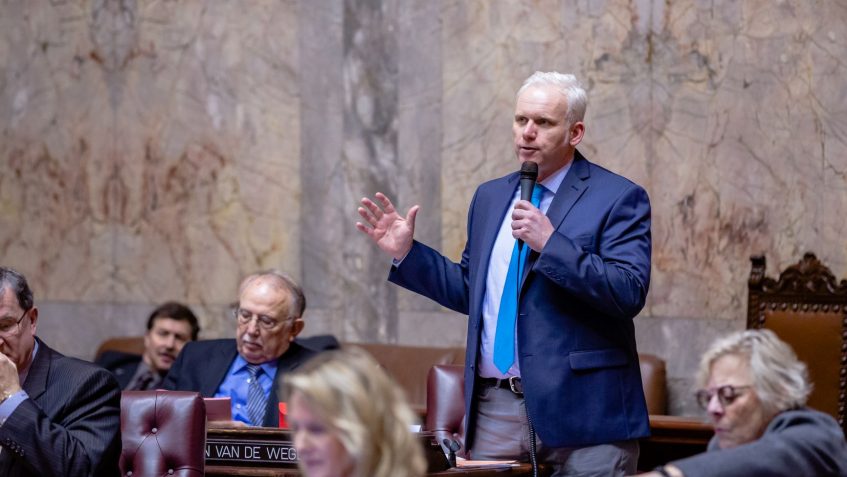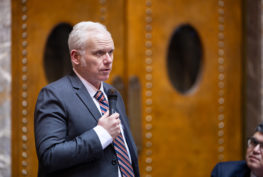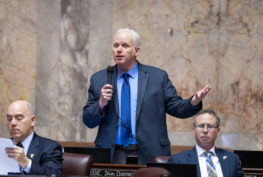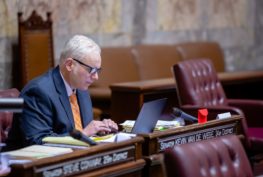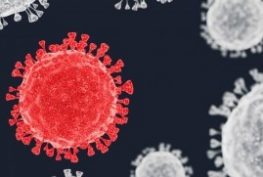A few short months ago, as we began a new legislative session, the landscape was very different. Few people had heard of coronavirus, and we could not have imagined the havoc it would unleash on our state. Within weeks, however, the pandemic hit and everything changed — in Olympia, throughout the 24th District, across our state and nation, and around the globe. The final weeks of the session focused heavily on the coronavirus, and that remains our priority as we continue to respond to the pandemic.
While we were in Olympia, however, we still had to fulfill our legislative responsibilities — and we did. And my priority, as always, was on creating family-wage jobs in rural areas — one of the vital community needs that now face heightened jeopardy due to the pandemic. Working in collaboration with my seatmates, Rep. Steve Tharinger and Rep. Mike Chapman, we sponsored and passed bills in both the Senate and House to provide additional support for timber harvesting and local wineries.
Senate Bill 6392 eliminates redundant and excessive licensing requirements when organizations like the Olympic Peninsula Winery Association host events to promote our terrific local wineries. This is no small change. The special occasion license that is currently required for each winery participating in a local event — with fees of $60 per event, per day, per winery — can cost a winery association more than $2,400 in total licensing fees for a single event. This change in law allows local wine industry associations to purchase a single, $700 license that will cover up to 12 events in a year — a considerable savings that should increase the ability of the state’s regional wine associations to promote local wines and wineries. And this not only helps our wineries but other local businesses as well. According to Executive Director Amy Harksell, more than half the people who come to Olympic Peninsula Winery Association events are out-of-towners who frequent our restaurants, hotels and other local businesses reliant on tourist dollars.
House Bill 2528, which I sponsored in the Senate with companion legislation, supports the timber industry’s important role in reducing carbon emissions. I know a lot of people think timber harvesting and environmental protection are mutually exclusive, but the truth is just the opposite. By aligning timber practices and cycles with the state’s carbon reduction goals, we can boost our rural economies and improve our environmental health at the same time. This new law recognizes the value of carbon sequestration by trees and directs the state Department of Commerce to promote markets for the state’s forest products.
Three other bills we helped pass will protect nursing home residents, public health, and wildlife.
My Senate Bill 6515 helps prevent residents in nursing homes from being displaced by enacting measures to stem the closures of struggling homes — a concern that’s all the more critical during this pandemic. The important thing is to ensure stability and safety for the most vulnerable members of our communities, and this bill helps by addressing Medicaid reimbursements that have fallen behind the actual costs of care. While this isn’t the only problem that’s led to an increase in nursing home closings, and though factors vary from facility to facility, this is one we can address immediately — and help seniors continue living in a safe setting with skilled nursing. The last thing nursing home residents need is to have to find a new place to live in a high-demand market while their health is at extraordinary risk.
House Bill 2265, another bill I sponsored with Senate companion legislation, addresses phasing out the use of a toxic chemical in firefighting foam and equipment that is known to contaminate natural water supplies and poses a heightened threat to pregnant women and small children as well as firefighters exposed to it in their work. Known to build up in the environment and in our bodies, per- and polyfluoroalkyl substances (PFAS) have been found in wells used for drinking water on Whidbey Island, Issaquah, Joint Base Lewis-McChord, and Airway Heights near Fairchild Air Force Base.
House Bill 2571, which I also sponsored in the Senate, protects wildlife areas by reclassifying minor fish and wildlife crimes as civil infractions. This will simplify prosecution and reduce court costs while also allowing for the suspension of hunting and fishing privileges for repeat violators and egregious violations. This provides the teeth necessary for our fish and wildlife officers to protect the natural resources that we all enjoy and which shape our regional character and quality of life.
![]()
